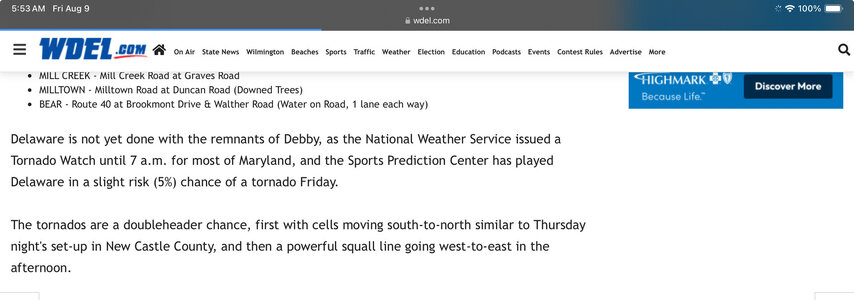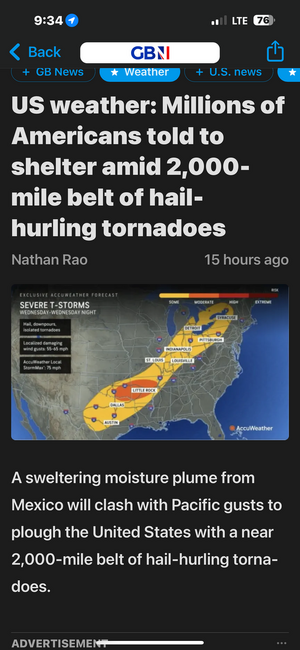Well that sucks. I don't know why - it is available to me.The video isn't available
-
While Stormtrack has discontinued its hosting of SpotterNetwork support on the forums, keep in mind that support for SpotterNetwork issues is available by emailing [email protected].
You are using an out of date browser. It may not display this or other websites correctly.
You should upgrade or use an alternative browser.
You should upgrade or use an alternative browser.
Poor Media Use of Weather Terminology
- Thread starter Jeff Duda
- Start date
Jamie H
EF3
Worked for me. Quite funny too!
Jeff Wright
EF4
- Joined
- Apr 23, 2010
- Messages
- 406
I think I know what inspired the movie THE LIGHTHOUSE:
Alvaro ivan
EF1
Alvaro ivan
EF1
Tepis Bencana di Rancaekek Bukan Badai Tornado, BMKG: Itu Angin Puting Beliung! (Indonesian)
BMKG Says Raging Winds in Rancaekek Not Tornado (english translation)
This could be an international cortender.
BMKG Says Raging Winds in Rancaekek Not Tornado (english translation)
This could be an international cortender.
Alvaro ivan
EF1
I uhhhhh....what? What do you mean by "alleged tornado"?
Boris Konon
EF4
The rule is, and this came about sometime in the 2010s I believe, is that until the NWS confirms a tornado, the media can not say it was a tornado, even if it is 100% clear from damage, photos, and/or video. I know, sounds too absolute.I uhhhhh....what? What do you mean by "alleged tornado"?
What I don't like in the statement, and this happens much too often in the MSM and social media posts by individuals, is the generalization "leveled the community" or other absolute lines like "the town is completely gone." That is misleading. It implies the *entire* community/town was destroyed, which is *not* the case most of time. And damage photo/videos plainly show that a large part of Gteenfield was not damaged by the tornado. Think about people reading that headline with friends/family in said community/town. It makes it sound worse that it actually is. Typical over-hyping. Not every event is like Greensburg KS.
Mike Smith
EF5
Whose "rule"?The rule is, and this came about sometime in the 2010s I believe, is that until the NWS confirms a tornado, the media can not say it was a tornado, even if it is 100% clear from damage, photos, and/or video
We have freedom of the press and the media can say anything about weather that it wants. Can't libel a cumulonimbus.
Ryan Schwartz
EF1
Using "boring" language doesn't get clicks and likes...The rule is, and this came about sometime in the 2010s I believe, is that until the NWS confirms a tornado, the media can not say it was a tornado, even if it is 100% clear from damage, photos, and/or video. I know, sounds too absolute.
What I don't like in the statement, and this happens much too often in the MSM and social media posts by individuals, is the generalization "leveled the community" or other absolute lines like "the town is completely gone." That is misleading. It implies the *entire* community/town was destroyed, which is *not* the case most of time. And damage photo/videos plainly show that a large part of Gteenfield was not damaged by the tornado. Think about people reading that headline with friends/family in said community/town. It makes it sound worse that it actually is. Typical over-hyping. Not every event is like Greensburg KS.
Boris Konon
EF4
Sorry, "rule" was perhaps the wrong word to use. Either way, using "possible" or "alleged" for tornadoes until the NWS confirms them seems to taken hold in the MSM. It must have come from somewhere. Is there any marketing advantage (to draw more eyeballs, among other things) from a news standpoint by adding uncertainty to events that are completely clear they are a tornado from photos/video/damage? Or another possibility, does it make a difference from an insurance POV if a home is damaged/destroyed by straight-line winds or a tornado? Did the powers that be in the insurance business push to have "possible" or "alleged" used until the NWS confirms a tornado or not?Whose "rule"?
We have freedom of the press and the media can say anything about weather that it wants. Can't libel a cumulonimbus.
It's hard to believe these prefix modifiers for something as newsworthy and serious as a tornado just started in recent years in a vacuum.
Mike Smith
EF5
FYI...
We did a lot of work with insurance companies at AccuWeather Enterprise Solutions before I retired: this included forecasting potential catastrophes as well as doing forensic work pertaining to claims.
While it makes a big difference whether it was wind or water that did the damage in a hurricane, unless something has changed since 2018, a tornado and thunderstorm-generated winds are both "windstorms" and it does not matter.
BTW: the NWS's opinion w/r/t hurricane ("Superstorm" Sandy), or tornado, or derecho or whatever, has no effect in litigation. Both sides will usually bring in expert consultants/witnesses and the jury will make their own determination. An opinion from a National Disaster Review Board might have somewhat more weight. We know of situations where the NWS refused to call a tornado a tornado (in spite of photos of the tornado with debris cloud, couplet on radar, etc.) because they didn't have a warning out. That's why I want my NDRB to take over storm verification from the NWS.
We did a lot of work with insurance companies at AccuWeather Enterprise Solutions before I retired: this included forecasting potential catastrophes as well as doing forensic work pertaining to claims.
While it makes a big difference whether it was wind or water that did the damage in a hurricane, unless something has changed since 2018, a tornado and thunderstorm-generated winds are both "windstorms" and it does not matter.
BTW: the NWS's opinion w/r/t hurricane ("Superstorm" Sandy), or tornado, or derecho or whatever, has no effect in litigation. Both sides will usually bring in expert consultants/witnesses and the jury will make their own determination. An opinion from a National Disaster Review Board might have somewhat more weight. We know of situations where the NWS refused to call a tornado a tornado (in spite of photos of the tornado with debris cloud, couplet on radar, etc.) because they didn't have a warning out. That's why I want my NDRB to take over storm verification from the NWS.
Jamie H
EF3
Sorry, "rule" was perhaps the wrong word to use. Either way, using "possible" or "alleged" for tornadoes until the NWS confirms them seems to taken hold in the MSM. It must have come from somewhere. Is there any marketing advantage (to draw more eyeballs, among other things) from a news standpoint by adding uncertainty to events that are completely clear they are a tornado from photos/video/damage? Or another possibility, does it make a difference from an insurance POV if a home is damaged/destroyed by straight-line winds or a tornado? Did the powers that be in the insurance business push to have "possible" or "alleged" used until the NWS confirms a tornado or not?
It's hard to believe these prefix modifiers for something as newsworthy and serious as a tornado just started in recent years in a vacuum.
I can't speak for the USA, but having some time and training as a journalist, individual outlets will have their own standards and legal best practice. While it won't seem too important whether a tornado is called alleged or not with a clear video, it'll be part of the in-house standard across the board.
Matthew Crowther
EF4
Jamie H
EF3
For some context - this "journalist" is an long term joke. Used to write for a daily newspaper with apocalyptic headlines that would never come true. The outlet he is now writing for here also makes no attempt to hide its biases.
Google his name and enjoy the nonsense!
Google his name and enjoy the nonsense!
JamesCaruso
Staff member
Here is an excerpt from an online article about yesterday evening’s confirmed tornado in Delaware.

Apparently SPC may be able to help us make some money from sports betting. Looks like this must have been written by the sports reporter, who obviously had sports on the brain not only with his SPC reference but also with his “doubleheader” analogy.

Apparently SPC may be able to help us make some money from sports betting. Looks like this must have been written by the sports reporter, who obviously had sports on the brain not only with his SPC reference but also with his “doubleheader” analogy.
Similar threads
- Replies
- 55
- Views
- 7K
- Replies
- 4
- Views
- 3K
- Replies
- 26
- Views
- 12K

